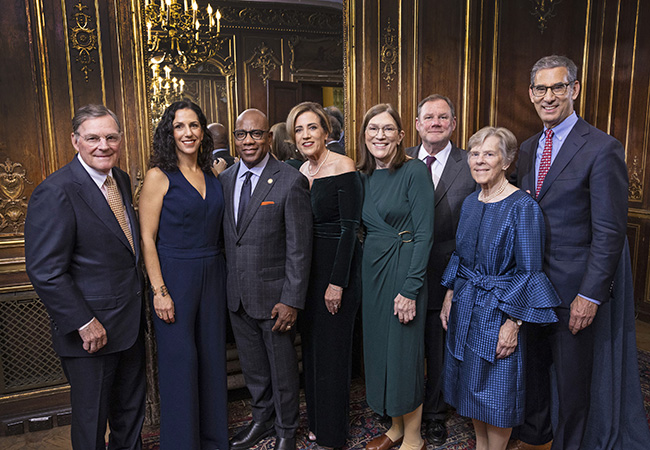2023 McGraw Prize in Education awardees reflect on changing lives, starting with their own

From left, Harold W. McGraw III, Penn GSE Dean Katharine Strunk, David Wilson, Deborah Duardo, Barbara Oakley, Robert McGraw, Suzanne McGraw, and Catalyst @ Penn GSE's Michael Golden at the McGraw Prize celebration on November 8.
How can educators help learners discover who they want to become and the path that will get them there?
As they accepted their Harold W. McGraw, Jr. Prizes in Education on November 8 at the Morgan Library & Museum in New York City, Debra Duardo, David Wilson, and Barbara Oakley each reflected on their lives, and how these questions have pushed them forward.
While these awardees have done groundbreaking work — Duardo in Pre-K–12 classrooms, Wilson on college campuses, and Oakley advancing lifelong learning — each spoke about their search for the next breakthrough, one that will create even more opportunities for learners to thrive. Showcasing that drive for educational innovation was a reason the McGraw Family Foundation created the prize in 1988.
“The creativity, the passion, the innovation, the knowledge, the intelligence and the desire and drive to help others - that is what this honor is all about,” said Harold McGraw III, former Chairman, CEO and President of The McGraw-Hill Companies.
Based at the University of Pennsylvania Graduate School of Education, the McGraw Prize is the most prestigious prize in education. Duardo, Wilson, and Oakley join a distinguished list of more than 100 teachers, professors, superintendents, university presidents, non-profit leaders, entrepreneurs and public officials who have shaped the education landscape.
The awardees were submitted for consideration by their peers, with winners then selected during three rounds of judging, including a final round by an independent panel of esteemed leaders in the field. Nominations for the 2024 McGraw Prize in Pre-K–12 learning, higher education, and lifelong learning are now open.
This year also marked the first time the McGraw Prize was awarded for promoting lifelong learning.
“As our society becomes more complex and our challenges seem more intractable, we have never had a greater need to give people opportunities to enhance their skills, reinvent their careers or simply follow their curiosity,” said Penn GSE Dean Katharine Strunk.
Over the course of the November 8 celebration, Duardo, Wilson, and Oakley told their stories.
When Duardo, the daughter of Mexican immigrants, dropped out of high school after the first week, “no one came looking for me.” She later became a teenage mother to a son with spina bifida.
Growing up on a sharecropping plantation, Wilson didn’t regularly attend school until the seventh grade.
Oakley’s family moved throughout her childhood, and she always felt behind. Now a distinguished professor of engineering, she flunked math and science throughout high school.
Many people in their situations never make it to a stage in New York or become leaders in their field. They feel they never have the chance. All three winners want to change that.
Duardo, Superintendent of the Los Angeles County Office of Education, spoke of her office’s work to bring together resources to support students, particularly the justice-involved, the unhoused, and those in the foster care system.
“I firmly believe that children cannot learn if their basic needs, including physical, mental, and emotional health, are unmet,” Duardo said. “Public schools serve as vital community institutions, places of trust where families and students turn not only for educational needs but also for essential support.”
Wilson, President of Morgan State University, said that he was accepting the higher education prize on behalf of the “collective, selfless, dedicated efforts of countless individuals who champion the important mission at Morgan that we simply refuse to see as impossible.” Under Wilson’s leadership the Historically Black University has seen a dramatic rise in graduation rates.
“We take calculated risks in admitting some of these students, but such risks are often met with intrinsic and incalculable rewards,” Wilson said. “As compensation, we are richly rewarded with the incomparable experience of literally watching our students blossom before our very eyes as they become acquainted with the life of the mind and discover their place in the world.”
Oakley, a Professor at Oakland University, described the process that led her to develop Massive Open Online Courses that have now been taken by more than five million people, and helped learners of all ages master concepts in math, sciences, languages, and more.
“I was surprised to find that people worldwide are fascinated to learn how you really learn in math and science—as told by someone who made the switch from math-hater to math aficionado and electrical engineer only in her later twenties,” Oakley said. “I realized, though, that the people I most wanted to reach often don’t read books. But they do watch videos.”
Understand what learners want and need. Discover how to offer that in a usable way. And most importantly, give learners a reason to keep believing in themselves. If you do that, Duardo, Wilson, and Oakley have shown, you can change not just a life, but a system.
You May Be Interested In
Related Stories
- 2023 McGraw Prize winners selected for improving Pre-K–12 student outcomes, increasing college graduation rates, facilitating adult learning, and more
- The Harold W. McGraw, Jr. Family Foundation makes landmark gift to Penn Graduate School of Education
- 2021 Harold W. McGraw, Jr. Prize in Education honorees boast transformative accomplishments, Penn ties
